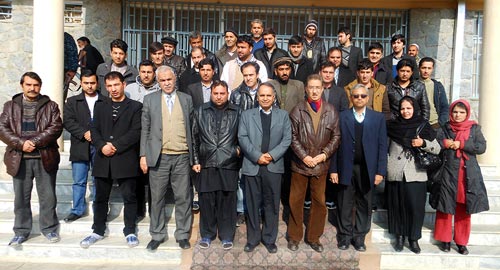By Rajiv Sharma /CIMMYT
CIMMYT-Afghanistan organized a training event for staff from the Agricultural Research Institute of Afghanistan (ARIA) of the Ministry of Agriculture, Irrigation and Livestock (MAIL) from 26-29 January in Kabul. Entitled “Experimental Design: Constitution, Analysis and Interpretation,” the event helped identify constraints to improving the quality of research and strengthen the capacity to integrate statistical procedures in research methodologies. Agricultural research deals with variability stemming from both controllable and uncontrollable sources.
Partitioning out the two and determining whether observed variation originates from real differences or are from chance is central to field experimentation. When Ram Sharma, cereal breeder for the International Center for Agricultural Research in the Dry Area (ICARDA) and instructor of the event, asked participants what they expected to learn from the training, they responded that they were interested in how to design an experiment as well as how to interpret and write scientific reports. Sharma is also part of the CGIAR Program for Central Asia and Caucasus, Tashkent.

The event was attended by 35 participants from ARIA, the Department of Plant Protection and Quarantine (PPQD), the Japan International Cooperation Agency (JICA), Joint Development Associates, MAIL, Kabul University and the MAIL Department of Irrigation. Sharma emphasized the importance of statistics in agricultural research as well as the use of replication, randomization and local control. Completely randomized designs (CRD) and factorial designs were also covered. Sharma explained that CRD can be used to analyze a farmer’s field after cultivation to determine in-field variance. He also taught the participants how to use crop statistic software and make a field book using computer programs. Example analyses showed attendees how to analyze their own data and interpret them. Qasem Obaidi, director of ARIA, closed the program and said it was helpful for the researchers and agronomists.
He thanked CIMMYT-Afghanistan, Sharma and CIMMYT’s Rajiv Kumar Sharma for their help. CIMMYT-Afghanistan also used the occasion to congratulate three of its staff members, Abdul Qayum, Shafi Ahmad and Mohammad Nasim, for completing 10 years of service to CIMMYT.
 Capacity development
Capacity development 
